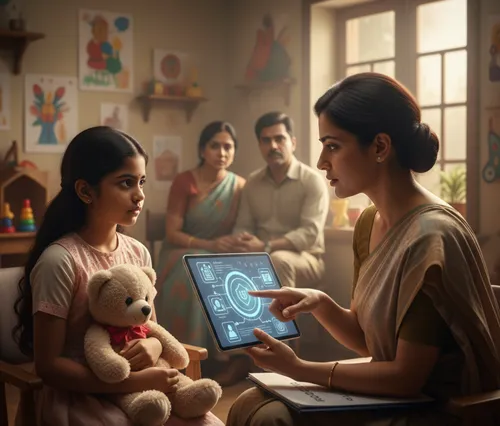
Objective:
To safeguard children under 18 years from sexual abuse, harassment, and exploitation, ensuring justice in a child-friendly and time-bound manner.
Key Features
- Inclusive Protection: Applies equally to male and female children.
- Comprehensive Coverage: Addresses all forms of sexual offences, including inappropriate touching, sexual remarks, rape, and child pornography.
- Child-Friendly Procedures: Ensures victim identities are protected, hearings are conducted sensitively, and statements are recorded in a non-intimidating manner, preferably by female officers.
- Stringent Punishments: Provides for severe penalties, including life imprisonment for serious offences.
- Mandatory Reporting: Obligates individuals to report cases of child sexual abuse; failure to do so is punishable.
- Special Courts: Establishes Special Courts for swift and sensitive trials.
Frequently Asked Questions (FAQs)
-
1. What is the POCSO Act?
-
A law to protect children under 18 from sexual abuse, harassment, and exploitation.
-
2. Who is considered a "child" under this Act?
-
Any person below the age of 18 years.
-
3. Does this law protect both boys and girls?
-
Yes, it protects all children regardless of gender.
-
4. What types of acts are considered offences under POCSO?
-
Any sexual activity like inappropriate touching, showing private parts, making sexual remarks, rape, or making child pornography.
-
5. What is the punishment for sexual offences under POCSO?
-
Depending on the offence, punishment ranges from 3 years to life imprisonment.
-
6. Can someone be punished for just touching a child inappropriately?
-
Yes, even non-penetrative sexual assault is punishable.
-
7. What is "Aggravated Sexual Assault"?
-
When the offender is a person in a position of trust—like a teacher, doctor, police officer, or relative.
-
8. Is watching or sharing child pornography also a crime under POCSO?
-
Yes, storing, viewing, or distributing child sexual material is a serious offence.
-
9. Can a minor boy be charged under POCSO for being in a relationship with a girl?
-
Yes, legally both are minors and not allowed to consent, so even consensual acts can attract charges.
-
10. Is it mandatory to report a case of child sexual abuse?
-
Yes, not reporting is also punishable under the Act.
-
11. Who can file a complaint under POCSO?
-
The child, parents, guardians, teachers, neighbours—anyone aware of the offence.
-
12. Can a child be called to court to testify?
-
Yes, but in a child-friendly environment, and the child's privacy is protected.
-
13. Can the name or identity of the child be revealed?
-
No, it is illegal to reveal the identity of the child in media or public.
-
14. Is there a time limit to file a complaint?
-
No, complaints can be filed at any time after the abuse.
-
15. What is a Special POCSO Court?
-
A court specially designated to handle child sexual abuse cases quickly and sensitively.
-
16. What if the accused is a family member?
-
The law still applies fully—even parents, relatives, or guardians can be punished.
-
17. Can a false complaint under POCSO lead to punishment?
-
Yes, but only if it is proved that the complaint was intentionally false.
-
18. Who supports the child during the case?
-
A support person or child welfare committee may be assigned to help the child through the legal process.
-
19. Can the child get medical help and counselling?
-
Yes, free medical aid, psychological support, and shelter (if needed) are available.
-
20. How can someone report a case of child sexual abuse?
-
By going to the police, calling Childline 1098, or contacting the Child Welfare Committee (CWC).
Add new comment